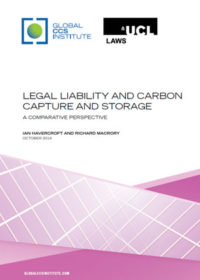Resources
Publications
Our publications, reports and research library hosts over 500 specialist reports and research papers on all topics associated with CCS.
View our Publication Library Disclaimer.
Filter by
Lessons and Perceptions: Adopting a Commercial Approach to CCS Liability
14th August 2019
Organisation(s): Global CCS Institute
Topic(s): CCS liability, CCS projects, Liability
Liability has long been raised as a significant barrier to the wide scale deployment of carbon capture and storage (CCS). Despite regulatory developments, the topic of liability continues to be considered by some CCS project developers, policy-makers and regulators as a critical issue and potential ‘show-stopper’ for the technology’s deployment.
This report, through policy and regulatory analysis as well as interviews with policy makers, regulators, lawyers, project proponents and representative from the insurance sector, seeks to challenge these views and make the case for a more commercially-minded view of liability.
The report’s findings reveal that many of the liabilities borne under CCS-specific models are both familiar and eminently manageable. Furthermore, the report demonstrates proposed solutions and examples available in addressing liability for those seeking to invest in or operate CCS projects.
The report also examines the meaning of liability throughout the CCS lifecycle and the unique challenges presented by greenhouse emissions/climate liabilities. The critical role of government and the private sector in allocating and managing risks across the CCS project lifecycle, as well as the essential requirement for further engagement of the insurance sector to assist operators manage liabilities are also topics addressed through this timely report.
The report will be of particular interest to government policy makers, regulatory bodies, CCS project proponents, investors and those in the insurance sector wishing to further understand the topic of liability, the reasons why it is perceived as a barrier to CCS deployment and gain insights into how these barriers have been - and may continue to be - managed and overcome.
Legal liability and carbon capture and storage: a comparative perspective
1st October 2014
Topic(s): Carbon capture use and storage (CCUS), CO2 storage, Liability, Policy law and regulation
Legal liability issues remain critically important for the commercial development of carbon capture and storage (CCS). This co-authored report by Global CCS Institute and University College London largely focusses on the storage aspect of the CCS process. Storage is where the most distinctive liability challenges lie, largely due to the long time-scales involved.
The authors address three types of legal liability:
- Civil liability where third parties who have suffered harm seek compensation or a court order.
- Administrative liability where authorities are given powers to serve some form of enforcement or clean-up order.
- Emissions trading liability where an emissions trading regime provides a benefit for CO2 storage and an accounting mechanism is in place should there be subsequent leakage.
Disclaimer
The content within the Global CCS Institute Publications, Reports and Research Library is provided for information purposes only. We make every effort and take reasonable care to keep the content of this section up-to-date and error-free. However, we make no claim as to its accuracy, currency or reliability.
Content and material featured within this section of our website includes reports and research published by third parties. The content and material may include opinions and recommendations of third parties that do not reflect those held by the Global CCS Institute.
Dedicated CCS legislation
6th September 2012
Topic(s): Liability, Permitting, Policy law and regulation
International policy makers are increasingly viewing CCS technology as an appealing climate change mitigation option. However, as yet there is no overarching international agreement or regulatory framework governing the 'full-chain' of CCS activities, either onshore or offshore.
Various amendments have been made to the international and regional marine agreements, as well as proposals for new accounting methodologies under the international climate change agreements. As things progress, with many jurisdictions seeking to develop similar regulatory frameworks, it will be important to monitor the relationship between international, supranational, national and sub-national legislation.
1. EU Directive on the geological storage of CO2 (2009/31/EC)
EU Member States have an obligation under EU law to transpose the provisions of the CCS Directive into national law and must communicate the text of any such laws and other administrative measures to the European Commission. The deadline for communication specified in the Directive was 25 June 2011.
- Communication on the future of CCS in the EU
- Motion for a European Parliament Resolution - Davies Report
- Transposition of the EU Directive (2009/31/EC)
2. Australian CCS legislation
CCS legislation in the Australian context.
3. Canadian CCS legislation
CCS legislation in Canada.
4. Danish CCS legislation
CCS legislation in Denmark.
5. French CCS legislation
CCS legislation in France.
6. German CCS legislation
CCS legislation in Germany.
7. Norwegian CCS legislation
CCS legislation in Norway.
8. Dutch CCS legislation
CCS legislation in The Netherlands.
9. United Kingdom CCS legislation
CCS legislation in the UK including:
- Consultation: Towards Carbon Capture and Storage
- Consultation: Guidance on carbon capture readiness and applications
- Consultation on a framework for the development of clean coal
- Consultation on draft supplementary guidance for new coal power stations
- Consultation on the proposed offshore CO2 storage licensing regime
- Consultation on draft national policy statements for energy infrastructure
- Consultation on amendments to Pipeline Safety and Health and Safety Regulations
- Consultation on Environmental Permitting Regulations
- Consultation on CCS Directive and call for evidence on development of CCS infrastructure
- Consultation on electricity market reform
- Pollution Prevention Control amendment regulations consultation 2011
Disclaimer
The content within the Global CCS Institute Publications, Reports and Research Library is provided for information purposes only. We make every effort and take reasonable care to keep the content of this section up-to-date and error-free. However, we make no claim as to its accuracy, currency or reliability.
Content and material featured within this section of our website includes reports and research published by third parties. The content and material may include opinions and recommendations of third parties that do not reflect those held by the Global CCS Institute.
Property rights in relation to CCS
30th August 2012
Topic(s): Liability, Permitting, Policy law and regulation
- Overview
- Relevance to CCS
- What are the key applicable laws and principles?
- Key legal issues concerning CCS
Overview
The concept of property is concerned with the ownership of tangible or intangible things. Property rights can be conceived of as a bundle of rights that include, in addition to the right to own, the right to use and the right to enjoy. Property law comprises the rules and principles governing these proprietary rights. Legal principles concerning property often vary between different national and sub-national jurisdictions, but there are common concepts and questions that need to be asked when dealing with CCS issues.
Law uses the term 'property' in a number of different ways. 'Real property' refers to property of the land and anything growing on it, attached to it or built on it. Real property includes the physical property of the land, such as soil, and fixed assets such as buildings. More importantly, it includes legal rights concerning the land, such as a right of way or the right to extract minerals. Private property can refer to tangible assets over which the owner has exclusive and absolute rights, such as the wellhead equipment at a CO2 injection operation. The last is public property, which is not restricted to any one individual's use or possession and is owned by a public body. Intellectual property comprises commercially valuable products of the human intellect, such as a patentable capture technology. Though relevant to the commercial development of CCS, it will not be discussed in this section.
Relevance to CCS
Property rights are a key legal aspect of CCS operations. Determining property interests at a storage site is essential to acquiring the necessary surface and subsurface rights for injecting and storing CO2 in the target geological formation. Where CO2 is transported to the site by pipeline, property rights for constructing pipeline infrastructure must also be considered. The process by which property rights are granted to an operator can affect the cost of the overall CCS operations. Establishing how these rights are acquired, maintained or transferred over the lifetime of the project has implications for managing the liability for CCS projects. Liability for CO2 during the active injection phase of a project generally lies with the operator, who must have a right to store in the subsurface formation into which the CO2 is being injected. The right to this storage plus the stored CO2 must follow the entity that takes on the long-term stewardship of the storage site, whether it remains with the operator or is handed over to the state.
The legal treatment of property rights for CCS is frequently based on regimes governing property rights for natural resources. Mineral rights regimes are of particular interest given the analogous nature of oil and gas operations to CO2 transport and storage activities. Water rights are also pertinent since underground saline formations have significant potential for large-scale storage.
What are the key applicable laws and principles?
Land ownership
Historically, real property rights were based on the traditional principle that the owner of a piece of land owns everything above it and below it to an infinite extent. (This is the Cuius est solum, eius est usque ad coelum et ad inferos maxim, meaning 'whoever owns the soil, it is theirs up to Heaven and down to Hell' normally called the 'ad coelum doctrine'.) Thus, the owner of a piece of land would have exclusive rights to the surface and also any subsurface mineral interests. A mineral interest constitutes the rights to search for, develop and remove minerals from the subsurface. The surface estate includes all the rights to the real property of the land excluding the mineral interest. It can include subsurface substances not deemed to be minerals, such as gravel or water resources.
Property rights have evolved, and often the mineral interests have become separated from the ownership of the surface either through outright sales or a lease, resulting in different owners of each. In many jurisdictions, such as Australia, many countries of the European Union and Latin America, the mineral interest is vested in the state, resulting in no private ownership of minerals. In these jurisdictions, the state grant licences for the exploration and extraction of minerals beneath a surface owner's land. In a country such as the United Kingdom some minerals (coal, gas, gold and silver) have been acquired by the State under legislation, but other minerals remain with the landowner. Conversely, in the United States, all mineral interests in principle are privately held and cannot be expropriated by the state without compensation.
In the context of CCS, the most important component of the property interest is the subsurface pore space. In simple terms, pore space is the geological formation where CO2 is stored. With regard to storage in depleted hydrocarbon reservoirs, the ownership of the geological formation varies between jurisdictions. In some jurisdictions, such as Canada, ownership of the geological formation remains with the owner of the mineral interest after the minerals have been extracted. In others, such as in many US states, ownership of the geological formation remains associated with the surface estate. In jurisdictions where the mineral interest is owned by the state, pore space is typically also vested in the state, though this is not always clearly specified by existing laws. In some jurisdictions, legislation has now been passed to make clear that the state owns the pore space, for example, in the Province of Alberta in Canada.
Where mineral rights are in principle vested in the owner of the land but are now held by someone else (either through a sale or a lease), difficult legal questions can arise as to who owns the pore space for storing CCS - the owner of the mineral rights or the original landowner? Similar questions can arise for storage in saline formations, though the ownership of pore space in this type of formation may follow ownership of water resources more generally. In any event, it is likely to be important to look at the precise terms of the sale or lease of mineral interests relating to individual storage sites to determine the exact circumstances.
Property rights in the marine environment differ from onshore. In deciding who owns storage rights below the sea bed, it will be important to distinguish between the territorial waters of a state and the high seas. For further information on offshore property rights and governance see the UNCLOS page.)
Land use
An owner of land may enjoy any kind of right over it, including creating subsidiary interests in the property that allow others to use or benefit from the land. There are a number of different types of subsidiary interests used in the CCS context:
- Lease: A conveyance of a possessory interest that gives the tenant the exclusive right to use and enjoy land for a specified period of time in exchange for some sort of remuneration (e.g. payment). Oil and gas production activities are typically carried out under a lease agreement. Similarly, some jurisdictions already have processes in place to grant leases for CO2 storage sites (e.g. the United Kingdom);
- Licence: A grant of permission by the owner to an individual or entity to use the real property for a specific purpose. Unlike a lease, it does not transfer interest in the real property to the licence holder. It is not assignable and may be terminated or revoked by the owner at any time;
- Easement: The right of one estate owner to use or control the land of another for a specific limited purpose. Unlike a lease or licence, an easement may last forever, but it does not give the holder the right to possess, take from, improve, or sell the land. A good example of an easement is the right-of-way granted by a landowner to build a CO2 pipeline on private land; and
- Covenant: An agreement, usually in the form of a contract or deed between estate owners, that real property will be used in a certain way. A covenant may constitute a pledge to do something or refrain from doing something. A simple example of a covenant is the requirement to fence in surface installations at a CO2 injection site.
Acquiring property rights
Property rights may be acquired through voluntary means, involuntary means or adverse possession. Where land is privately owned, the landowner can decide to sell it or lease the surface or mineral interest to another private entity. Similarly, interests in publicly owned land can be sold or allocated for use to a private entity. In other cases, without requiring the consent of the private landowner, the state may have the power to take private property for its own use or to authorise the use of private property by a third party. Depending on the legal regime, the state may have to compensate the landowner for the property. These involuntary means of acquiring private property have different terms in different jurisdictions: eminent domain, compulsory purchase/acquisition, resumption, and expropriation. Lastly, property may be obtained through adverse possession of another's land for a continuous and uninterrupted period of time.
Illegitimate entry and interference
Also relevant to the discussion of property rights and CCS are the property rights of adjacent landowners in the event of activities that infringe on the property of another. Examples could be unintended migration of CO2 outside a selected storage area or impacts on a mineral resource from injected CO2. A landowner or tenant enjoys protection from illegitimate entry onto or interference with his property. Any wrongful entry on his real property constitutes a trespass. Any activity or situation that interferes with his use or enjoyment of property constitutes a nuisance. The landowner may take legal action to seek to stop an activity deemed to be trespass or nuisance or to recover damages incurred. In the CCS context, some instances of trespass are unambiguous. For example, where mineral and surface interests are severed, unauthorised use of the surface to access the subsurface would be considered trespass. However, in a case where substances injected into the subsurface migrate unexpectedly to neighbouring land, determining whether trespass has occurred is less straightforward.
International legal context
International law does not generally regulate real property rights, leaving these issues to be dealt with under national law. As an example, international law is silent on whether natural resources should be held in either public or private ownership. However, international law does play a role in regulating the enjoyment of such property rights by foreign nationals within the host state's borders. This is found particularly in the field of foreign investment law and international human rights.
Despite its silence on how property rights over natural resources and land should be regulated, international law imposes some restrictions on the way a state exploits the natural resources that are either under its sovereignty, shared by multiple states or held in common by all states. General obligations to exercise due diligence and adopt a preventative/precautionary approach in the use of a state's territory are imposed under international law in order to avoid transboundary harm to the territory of other states. States' cooperation in conservation, sustainable utilisation, and environmental protection are also required with respect to the exploitation of shared resources or resources in areas beyond national jurisdiction.
Key legal issues concerning CCS
- Pore space ownership has yet to be clearly articulated in some jurisdictions, resulting in uncertainty for permitting CO2 storage operations. In jurisdictions where the mineral interest is vested in the state, it is often assumed that the state also owns the pore space. However, governments that have declared ownership of valuable subsurface substances (e.g. coal and hydrocarbons), have allowed ownership of other subsurface substances to remain with the surface estate. For example, less valuable subsurface resources such as sand and limestone are sometimes associated with the surface estate. Therefore it is not necessarily clear that pore space would be automatically vested in the state just because there is no private ownership of the mineral interest. Some governments have resolved this issue by declaring that ownership of pore space is vested in the state. This was done, for example, in the Canadian Province of Alberta. In the United States, this type of declaration would not be possible without compensating landowners, since private ownership of the mineral interest is extensive.
- In many jurisdictions there is still no process for allocating CO2 storage rights or granting access to the subsurface. This process must consider competing uses of the property in question, especially how to prioritise CO2 storage rights versus oil and gas production.
- The duration of a right to store CO2 is linked to the long-term liability of the storage operation. In the predominant model for managing liability, the liability is transferred to a public body after closure once a series of conditions have been met. Where the pore space was owned or leased by a private entity during the operational phase, the rights to the pore space will have to be transferred to the public body taking on the liability for the site.
Disclaimer
The content within the Global CCS Institute Publications, Reports and Research Library is provided for information purposes only. We make every effort and take reasonable care to keep the content of this section up-to-date and error-free. However, we make no claim as to its accuracy, currency or reliability.
Content and material featured within this section of our website includes reports and research published by third parties. The content and material may include opinions and recommendations of third parties that do not reflect those held by the Global CCS Institute.
CCS liability legislation
30th August 2012
Topic(s): Liability, Permitting, Policy law and regulation
This section considers the legislation around liability in relation to CCS in Europe and Australia.
1. Liability under the European CCS Directive on the storage of CO2
We consider the liability provisions of the EU Directive on the geological storage of carbon dioxide and related legislation:
- Environmental Liability Directive (2004/35/EC)
- European Commission Guidance Documents Overview
- Summary and analysis of EC Guidance Document 3
- Summary and analysis of EC Guidance Document 4
2. Liability in Australian law for CCS activities
The Federal regulatory framework for offshore CCS activities is unique in Australia in that it provides mandatory indemnification by the Commonwealth Government for specified long-term liabilities.
Disclaimer
The content within the Global CCS Institute Publications, Reports and Research Library is provided for information purposes only. We make every effort and take reasonable care to keep the content of this section up-to-date and error-free. However, we make no claim as to its accuracy, currency or reliability.
Content and material featured within this section of our website includes reports and research published by third parties. The content and material may include opinions and recommendations of third parties that do not reflect those held by the Global CCS Institute.
Financing CCS
30th August 2012
Topic(s): Economics, Liability, Permitting, Policy law and regulation
In 2008, the IEA concluded that, without CCS, the cost of attaining the 50% reduction in greenhouse gas emissions by 2050, would increase by over 70% in the long term. On the basis of this, it is widely argued that investment in CCS would make the transition to a low-carbon economy substantially cheaper and more cost effective.
1. Financing CCS - Overview
This section gives an overview of the costs involved in financing CCS to reach the 2050 target and beyond.
2. Financing Strategies to Incentivise CCS in the EU
The EU approach to financing CCS is part of a broader effort to stimulate the transition to less carbon-intensive energy generation. Financial support for CCS projects consists of the following instruments:
- The European Emission Trading Scheme (ETS)
- European Energy Programme for Recovery (Regulation (EC) No. 663/2009)
- EU State Aid Legislation
Disclaimer
The content within the Global CCS Institute Publications, Reports and Research Library is provided for information purposes only. We make every effort and take reasonable care to keep the content of this section up-to-date and error-free. However, we make no claim as to its accuracy, currency or reliability.
Content and material featured within this section of our website includes reports and research published by third parties. The content and material may include opinions and recommendations of third parties that do not reflect those held by the Global CCS Institute.
Emission trading legislation and CCS
30th August 2012
Topic(s): Domestic policy, Liability, Permitting, Policy law and regulation
This section looks at emission trading legislation and CCS in the European context.
1. European emission trading legislation and CCS
The EU Emission Trading Directive has created an EU-wide scheme, which has established a market for greenhouse gas emissions allowances:
Disclaimer
The content within the Global CCS Institute Publications, Reports and Research Library is provided for information purposes only. We make every effort and take reasonable care to keep the content of this section up-to-date and error-free. However, we make no claim as to its accuracy, currency or reliability.
Content and material featured within this section of our website includes reports and research published by third parties. The content and material may include opinions and recommendations of third parties that do not reflect those held by the Global CCS Institute.
Onshore CO2 storage legal resources
30th August 2012
Topic(s): Carbon capture use and storage (CCUS), CO2 storage, Liability, Permitting, Policy law and regulation
Onshore CO2 storage legal resources considers the legislation and associated issues relating to onshore CO2 storage in Europe and Australia.
1. European waste legislation and onshore CO2 storage
This section considers the fundamental question of whether CCS processes and captured CO2 falls within the scope of EU waste legislation, and if so, what the implications would then be. Specifically we look at:
2. European water legislation and onshore CO2 storage
Here we look at European water legislation and its relationship to CCS activities including:
3. Australian onshore regulation
Here we consider how CO2 storage is dealt with at a federal and state level in Australia. At a state level we consider the state of Victoria, that enacted The Victorian Greenhouse Gas Geological Sequestration Act 2008 (No. 61 of 2008) which provides a dedicated legal framework enabling the onshore injection and permanent storage of greenhouse gas substances.
Disclaimer
The content within the Global CCS Institute Publications, Reports and Research Library is provided for information purposes only. We make every effort and take reasonable care to keep the content of this section up-to-date and error-free. However, we make no claim as to its accuracy, currency or reliability.
Content and material featured within this section of our website includes reports and research published by third parties. The content and material may include opinions and recommendations of third parties that do not reflect those held by the Global CCS Institute.
Offshore CO2 storage legal resources
30th August 2012
Topic(s): Carbon capture use and storage (CCUS), CO2 storage, Liability, Permitting, Policy law and regulation
Offshore CO2 storage legal resources covers activities relating to offshore CO2 storage in specific regions.
1. International marine legislation
This section looks specifically at current international marine legislation that may have a bearing upon the legality of CCS activities including:
2. European offshore CO2 storage
Here we look at legislation that relates specifically to the European marine environment, namely the North East Atlantic and North Sea:
3. UK offshore CO2 storage
This section looks specifically at the UK regulatory framework and the enactment of the Energy Act 2008, which is a framework for the licensing, enforcement and registration of CCS.
4. Australian offshore CO2 storage
Here we consider the regulatory framework created by the Australian Government for offshore CO2 storage based on amendments to existing petroleum legislation.
Disclaimer
The content within the Global CCS Institute Publications, Reports and Research Library is provided for information purposes only. We make every effort and take reasonable care to keep the content of this section up-to-date and error-free. However, we make no claim as to its accuracy, currency or reliability.
Content and material featured within this section of our website includes reports and research published by third parties. The content and material may include opinions and recommendations of third parties that do not reflect those held by the Global CCS Institute.
Legislation relating to CO2 transport for storage
30th August 2012
Topic(s): Carbon capture use and storage (CCUS), CO2 storage, CO2 transport, Liability, Permitting, Policy law and regulation
Here we consider the legal implications of transporting CO2 across international boundaries, for storage in marine environments, and more specifically, how CO2 transport for storage is dealt with in the European, UK and Canadian contexts.
1. International transboundary transport regulation for CO2 storage
Transport of CO2 is necessary when a suitable storage site is not close to the capture installation. During the transport phase, international law is relevant when CO2 crosses the territory of different states in order to reach the storage site. The Bamako Convention and the Basel Convention address this issue:
2. CO2 transport for storage and international marine legislation
International marine legislation has an impact upon the legal conditions for development of CCS offshore:
3. European and regional legislation on CO2 transport and storage
In a regional context, such as the European Union, transnational regulation of the transport phase is essential when CO2 is transported across the territory of different Member States in order to reach a storage site. The following legislation covers this:
4. UK laws regulating CO2 transport for storage
In the UK at present no legislation that expressly regulates CO2 transport by pipeline. The Health and Safety Executive (HSE) and the Department of Energy and Climate Change (DECC) have suggested CO2 be classified as a 'dangerous substance' or a 'dangerous fluid' and legislated accordingly.
5. Canadian laws regulating CO2 transport for storage
In Canada, there is no dedicated legislation regarding CO2 pipelines, either at federal or provincial level. Existing CO2 pipelines operate for the purpose of enhanced oil recovery (EOR) or acid gas disposal and are covered by existing pipeline legislation.
Disclaimer
The content within the Global CCS Institute Publications, Reports and Research Library is provided for information purposes only. We make every effort and take reasonable care to keep the content of this section up-to-date and error-free. However, we make no claim as to its accuracy, currency or reliability.
Content and material featured within this section of our website includes reports and research published by third parties. The content and material may include opinions and recommendations of third parties that do not reflect those held by the Global CCS Institute.
Pollution Prevention Control amendment regulations consultation 2011
1st February 2011
Topic(s): Liability, Permitting, Policy law and regulation
Consultation on The Environmental Liability (Prevention and Remediation) (Amendment) Regulations (Northern Ireland) 2011; Groundwater (Amendment) Regulations (Northern Ireland) 2011; The Pollution Prevention Control (Amendment) Regulations (Northern Ireland) 2011
Consultation period: 28 February 2011 - 22 April 2011
Government Response: awaiting
Consulting authority: Department of the Environment (Northern Ireland)
Content: This consultation is on amendments to be made to: Groundwater Regulations (Northern Ireland) 2009; Pollution Prevention and Control Regulations (Northern Ireland) 2003, and; Pollution Prevention and Control Regulations (Northern Ireland) 2003. These amendments are necessary in order to transpose Articles 32, 34 and 37 of the CCS Directive under powers devolved to the Northern Ireland Assembly.
Disclaimer
The content within the Global CCS Institute Publications, Reports and Research Library is provided for information purposes only. We make every effort and take reasonable care to keep the content of this section up-to-date and error-free. However, we make no claim as to its accuracy, currency or reliability.
Content and material featured within this section of our website includes reports and research published by third parties. The content and material may include opinions and recommendations of third parties that do not reflect those held by the Global CCS Institute.
The liability of carbon dioxide storage
1st February 2007
Topic(s): Carbon capture use and storage (CCUS), Liability
This is a lengthy and detailed thesis including an introduction to both CCS and liability in the US, followed by a dissection of the different types of liability which may be relevant in this context including liability for induced seismicity, groundwater contamination, damage to human health or environment. Draws comparisons with liability for similar operations such as acid gas injection, natural gas storage and enhanced oil recovery using case studies. Concludes with 'lessons learned' and proposed liability scheme.
Disclaimer
The content within the Global CCS Institute Publications, Reports and Research Library is provided for information purposes only. We make every effort and take reasonable care to keep the content of this section up-to-date and error-free. However, we make no claim as to its accuracy, currency or reliability.
Content and material featured within this section of our website includes reports and research published by third parties. The content and material may include opinions and recommendations of third parties that do not reflect those held by the Global CCS Institute.











